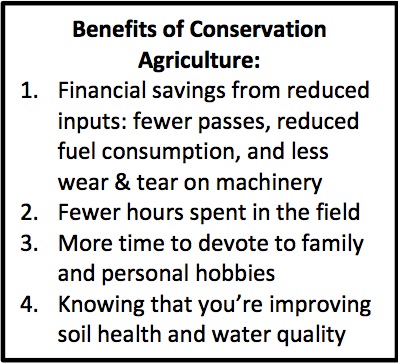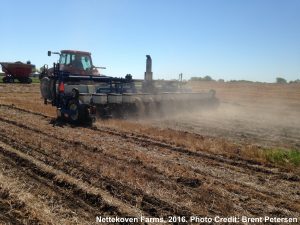Greg Nettekoven is a life-long producer, who was born and raised on the land he works and operates today. Over the course of the years, the farm and its landscape have changed; however, Greg’s passion and stewardship for the land remains. He recognizes the importance of leaving the land in a better condition for the next generation and as a result, he has approached farming as an opportunity to continually evolve and try new practices.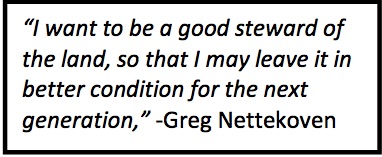
Nettekoven Farm was established in 1940 as a small dairy farm in Black Creek, WI. In 1988, Greg and his wife Karon, took over the family farm, which at that time had become a beef and hog farm. Over the years, they transitioned from livestock to a diverse mixture of vegetable crops. However, the operational changes on the farm were not the only changes taking place. Greg recalls seeing changes in the landscape, including soil erosion due to traditional land use practices, such as conventional tillage. For him, his motivation to find alternative practices stemmed from watching his valuable top soil be lost to wind and rain. Greg’s land ethic and passion for conservation has led him towards a path of improving soil health.
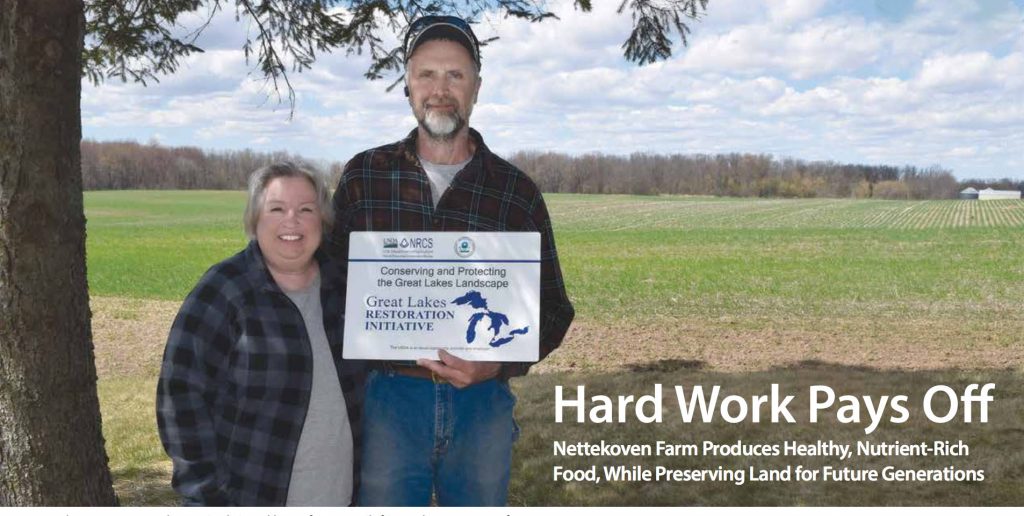
Image 1: Photo credit, NRCS, Wisconsin. Greg and Karen Nettekoven receiving recognition from NRCS for their continued efforts to implement conservation practices on their land.
Steps Towards Conservation:
As Greg transitioned towards conservation agriculture, he pursued assistance from conservation programs such as the U.S. Department of Agriculture’s (USDA) Environmental Quality Incentives Program (EQIP) and the Conservation Stewardship Program (CSP). Both programs provide financial and professional assistance for producers interested in implementing conservation practices on their land. Recognizing that transitioning from conventional to conservation practices requires initial up-front costs, the assistance made it feasible for Greg to begin. However, by focusing on soil health, Greg has realized that the benefits of implementing cover crops and no-till or mulch-till planting have outweighed the costs of transitioning and maintaining these practices.
Benefits of Conservation Agriculture: Time and Resources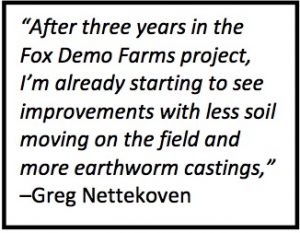
For Greg, he has experienced comparable yields between his conventional and conservation practices. However, he has seen financial savings when he factors in the reduced number of inputs required to make conservation agriculture work on his farm. Fewer passes means reduced gasoline consumption, as well as less wear and tear on his equipment; therefore, it is less costly to maintain and operate the machinery.
Additionally, Greg says that conservation practices have resulted in less time in the field and more time to enjoy with his family. Specifically, conservation tillage has been a tremendous time saver. Greg reflects back on the spring of 2015, when he spent the morning no-till planting that season’s soybeans. Rather than making multiple passes to work the land in preparation for planting, Greg was done in one pass and by afternoon, Karon and he were on the open road, enjoying one of their favorite hobbies…riding their motorcycles. In years past, planting was a multi-day job, but by putting aside the plow, he had the opportunity to take a much more enjoyable ride and create a memorable experience with his wife.
Greg’s Advice:
As a member of the Fox Demo Farms project, Greg’s ability to implement conservation practices, such as cover crops, have reached a record high. We are fortunate to have Nettekoven Farms on board and we encourage fellow producers to learn more about Greg’s efforts. We recognize that breaking from tradition is one of the most difficult barriers to overcome; however, the Fox Demo Farms was designed to provide producers the opportunity to see these practices in action. As Greg states, “it is our job to demonstrate the success of conservation practices.” Greg encourages producers to start small and talk with neighbors who are implementing conservation practices, as well as seek assistance from your local Natural Resource Conservation Service (NRCS) agents and your County Land & Water Conservation Department.
- Attend Fox Demo Farms events (i.e., Field Days)
- Seek assistance from your local County Land & Water Conservation Department and Natural Resource Conservation Service
- Start small and talk with neighbors who are implementing conservation practices
- Don’t be discouraged by upfront costs, the recognized benefits outweigh the costs
Nettekoven Farms’ Conservation Practices:
- Diverse cover crops: red clover, cereal rye, spring barley, tillage radish, and Australian peas
- No-till and mulch-till planting
- Frost seeding of red clover into winter wheat
- Planting in late summer after winter wheat harvest
- Gypsum and urea applications with cover crops
- Working with agronomist to ensure proper selection of herbicides in working with cover crops
- Drift reduction strategies for pesticides
- Co-op seed formula experimentations to find which mixtures work best
- Experimentation and use of an interseeder prototype
Additional Stories on Nettekoven Farms:
USDA Success Stories: “Hard Work Pays Off”
Basin Buzz: “Quit Treating Your Soil Like Dirt!”
